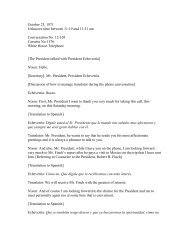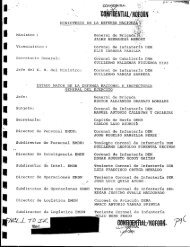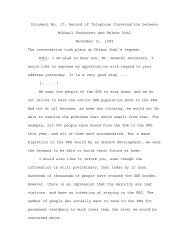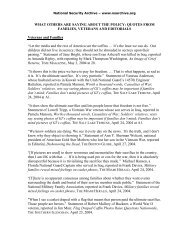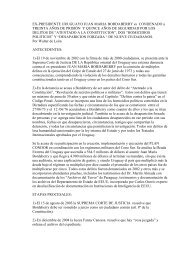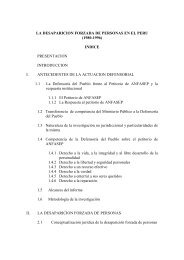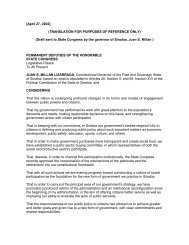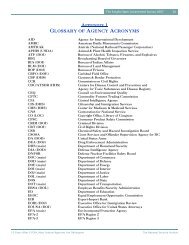TERRORISM 98 - FBI
TERRORISM 98 - FBI
TERRORISM 98 - FBI
Create successful ePaper yourself
Turn your PDF publications into a flip-book with our unique Google optimized e-Paper software.
SAFEGUARDING<br />
U.S. MILITARY POSTS<br />
It has always been the policy of the U.S.<br />
Government to protect military personnel, their families,<br />
government facilities, and other resources,<br />
whether overseas or in the United States. A growing<br />
number of short- and long-term peace-keeping and<br />
humanitarian missions--as well as several deadly<br />
attacks on U.S. military installations in the 1<strong>98</strong>0s<br />
and 1990s--has increased the focus on force protection<br />
issues as the Department of Defense (DoD) has<br />
sought ways to minimize the susceptibility of the U.S.<br />
military to terrorist attacks.<br />
Force protection is defined as "the security<br />
program designed to protect soldiers, civilian employees,<br />
family members, facilities, and equipment in all<br />
locations and situations, accomplished through<br />
planned and integrated application of antiterrorism<br />
and counterterrorism, physical security, operations<br />
security, and personal protective services, supported<br />
by intelligence, counterintelligence, and other security<br />
programs." During the 1990s the <strong>FBI</strong> has expanded<br />
its liaison with DoD to further enhance the<br />
antiterrorism and counterterrorism components of<br />
the force protection effort.<br />
Overseas, <strong>FBI</strong> Legal Attaches (LEGATs)<br />
establish and maintain liaison with principal law<br />
enforcement and security services in designated foreign<br />
countries. <strong>FBI</strong> Special Agents work with law<br />
enforcement officials from these host nations to<br />
address terrorism and other international crimes,<br />
including the issue of force protection. LEGATs<br />
develop close cooperation with their defense counterparts<br />
and are often the first point of contact for military<br />
commanders overseas in the event of a terrorist<br />
incident. The bombings of the Office of Program<br />
Management-Saudi Arabian National Guard (OPM-<br />
SANG), which killed 5 Americans, and Khobar<br />
Towers in Dhahran, Saudi Arabia, which killed 19<br />
U.S. airmen and wounded approximately 240 U.S.<br />
service members, underlined the need for close cooperation<br />
among various agencies.<br />
Information sharing between the <strong>FBI</strong> and<br />
the military also has been enhanced through <strong>FBI</strong> liaison<br />
with the Defense Intelligence Agency (DIA) and<br />
other DoD components. This cooperation helps<br />
ensure that appropriate information is disseminated<br />
to a wide range of recipients, including military commands,<br />
in the United States and around the world.<br />
Cooperation has grown significantly during the past<br />
several years, strengthened through the cross-dissemination<br />
of threat warnings and joint exchanges, as<br />
well as <strong>FBI</strong> participation in threat scenario exercises<br />
and briefings to senior military commanders.<br />
Domestically, force protection includes cooperation<br />
between the military and federal, state, and<br />
local law enforcement agencies to the extent allowed<br />
by applicable law. <strong>FBI</strong> field offices have established<br />
liaison with Provost Marshals on military bases within<br />
their areas of responsibility. Liaison between local<br />
military commands and <strong>FBI</strong> field offices enhances<br />
cooperative relationships and investigative coordination<br />
prior to any potential incidents and promotes a<br />
clear understanding of responsibility should a terrorist<br />
incident occur.<br />
Targeting of Bases in the United States<br />
Some extremist right-wing elements in the<br />
United States believe that the United Nations<br />
(U.N.) is secretly plotting to undermine the authority<br />
of the U.S. Constitution as part of its ultimate<br />
objective of creating a "one-world government."<br />
Many of these extremists also believe that U.S. military<br />
installations are currently being used as training<br />
facilities for U.N. forces preparing to take over the<br />
United States as part of this New World Order.<br />
(Much of the rhetoric espoused by right-wing<br />
extremists holds that while U.S. troops operating<br />
under the U.N. banner would be involved in the<br />
overthrow of legitimate governments in other countries,<br />
foreign troops--also operating under the auspices<br />
of the U.N.--would be used to subdue the<br />
United States because these troops would be less<br />
inhibited by the specter of firing upon U.S. citizens<br />
than would U.S. military personnel.)<br />
In July 1997, the <strong>FBI</strong> and state and local<br />
authorities in Texas, Colorado, and Kansas thwarted<br />
an attack on Fort Hood, Texas, being planned by<br />
right-wing extremists who apparently held such<br />
beliefs. In June 1997, undercover officers advised the<br />
<strong>FBI</strong> that Bradley Glover, a self-proclaimed militia<br />
Brigadier General, was allegedly holding meetings<br />
where he discussed the imminent threat of a U.N.<br />
invasion of the United States, the possibility of going<br />
<strong>TERRORISM</strong> IN THE UNITED STATES 19<strong>98</strong><br />
19




